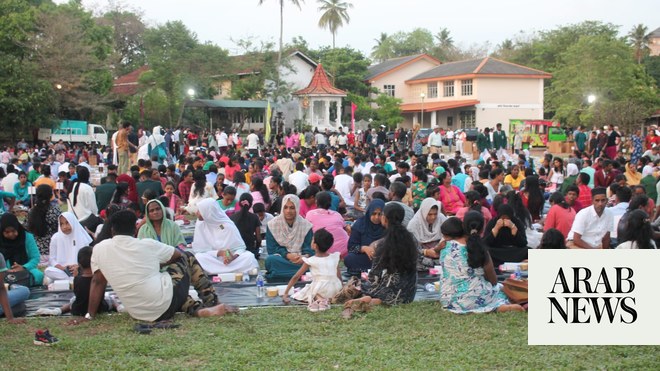
Intelligence officers ignored warnings, says Islamic body
There have been reports of attacks on Muslim homes and businesses
COLOMBO: The people of Dharga Town, Sri Lanka, are familiar with violence and loss. In 2014, anti-Muslim riots killed four, injured dozens and left behind a trail of torched homes and businesses.
Now, almost a week after deadly terror attacks devastated the tropical island, the Muslims in Dharga Town are afraid following Daesh’s claim for the bombings.
“At the end of the day, we have to think about what they (the terrorists) are going to get from this. What have they gained? They’ve lost everything,” 38-year-old businessman M. Imthias told Arab News outside Meera Masjid. “We’ve already been through this, and we know the pain, fear, and emotions they (the Catholics) are going through.”
The Daesh claim, issued through the group’s AMAQ news agency, was made after Sri Lanka said two domestic extremist groups with suspected links to foreign militants were thought to be behind the attacks at three churches and four hotels. More than 350 people were killed and around 500 were wounded in the Easter Sunday violence.
Muslims in Dharga Town fear that efforts to rebuild after the 2014 violence are in vain. Anti-Muslim sentiments are emerging and are fueled by remarks from government officials, such as Defense Minister Ruwan Wijewardena saying the bombings were retaliation for last month’s New Zealand mosque bloodshed.
There have been reports of attacks on Muslim-owned shops, homes, and a mosque in Sri Lanka. There have also been renewed calls to ban the burqa, citing security reasons and Islamist extremism.
But there is also anger toward the National Thawheed Jamath (NTJ), the group initially identified as being responsible for the attacks. Dharga Town residents told Arab News they believed the perpetrators carried out the attacks for personal reasons, not religious ones, as Islam forbids suicide.
The mood in the town is sombre. Shutters are drawn across windows and stores, including supermarkets, are closed. Men gather in small groups along the road, and the area has an increased military presence. People say perpetrators of the assault should face the death penalty.
Around 20 people in Dharga Town belong to the Sri Lanka Tawheed Jamaath (SLTJ), a faction unpopular with the wider Muslim community. Six SLTJ members were arrested on Tuesday afternoon. The mosque — a shack-like structure — did not open for prayers afterwards. Dharga Town residents opposed the SLTJ establishing a community in the area because of their orthodox ways.
“They wanted to build a mosque, but we didn’t allow it. In the end, they built that place with the iron sheets, and conduct their prayers there,” a village elder, who did not wish to be identified, told Arab News. “If they come for prayers, or engage with us in anything, they always try to push their beliefs on us. What they call Islam is completely different from what we practice.”
The NTJ was ostracized by the All Ceylon Jammiyathul Ulema (ACJU), Sri Lanka’s highest body of Islamic scholars. The organization relayed its suspicions about the NTJ to authorities.
“On Jan. 3, we visited intelligence officers and handed over files with all the details of the perpetrators urging them to take necessary action to stop the NTJ. This was completely ignored,” an ACJU scholar said.
The situation in Sri Lanka remains tense, with nightly curfews and reports of bomb threats. There is also confusion after the Defense Ministry said the NTJ was not behind the attacks, leaving the public afraid about the possibility of another splinter group.
But there are calls for calm, too.
“There is no such anger among us,” Sister Manuja, who survived the St. Sebastian Church bombing, told Arab News. The Catholic community would not seek vengeance, she added. “We are very quiet, very simple people.”












